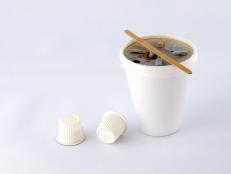Wake Up to Good News About Coffee

Those of us who are addicted to coffee (put down that third cup of joe and raise your hand) would probably love to think all that java consumption is good for us in ways beyond just waking us up. Well, guess what? A new study has found that drinking coffee – both caffeinated and decaf – may be beneficial for your liver, helping to protect it.
For the study, published online in the journal Hepatology, researchers tracked the coffee drinking and liver function of 27,793 people and found that those who drank three cups of coffee a day were about 25 percent more likely to have normal liver enzyme levels, an indicator of good liver function, than those who drank no coffee. The results held true for coffee drinkers regardless of whether they favored caffeinated or decaffeinated coffee, though the study did not pinpoint a cause.
"There are more than a thousand compounds in coffee," the study's lead author, Qian Xiao, a National Cancer Institute cancer prevention fellow, told The New York Times. "There are a few candidates, but I don’t know which is responsible."
- It may lower your risk of death, including from such causes as heart disease, respiratory disease, stroke, injuries and accidents, diabetes and infections, according to the New England Journal of Medicine, though not from cancer.
- Coffee and caffeine consumption has also been linked to a lower risk of suicide.
- Coffee drinkers may be at lower risk for developing type 2 diabetes.
- Male coffee drinkers may be at a reduced risk for Parkinson's disease.
- Caffeinated coffee may reduce the symptoms of asthma.
- Drinking caffeinated coffee may lower the risk of developing gallstones.
- Caffeine may enhance cognition and boost long-term memory.
And while moderation is, of course, recommended (as is brewing with paper filters and not loading your cup with cream and sugar), a new study has indicated that our bodies may help us regulate our caffeine intake more than we realize.
"Our results show that people are naturally consuming the amount of coffee that allows them to maintain their optimal level of caffeine," that study's lead author, Marilyn Cornelis, a research associate at the Harvard School of Public Health, told the Atlantic. "If we need more, we're reaching for it."
In other words, you can fill your cup with confidence. Good morning to you!

































